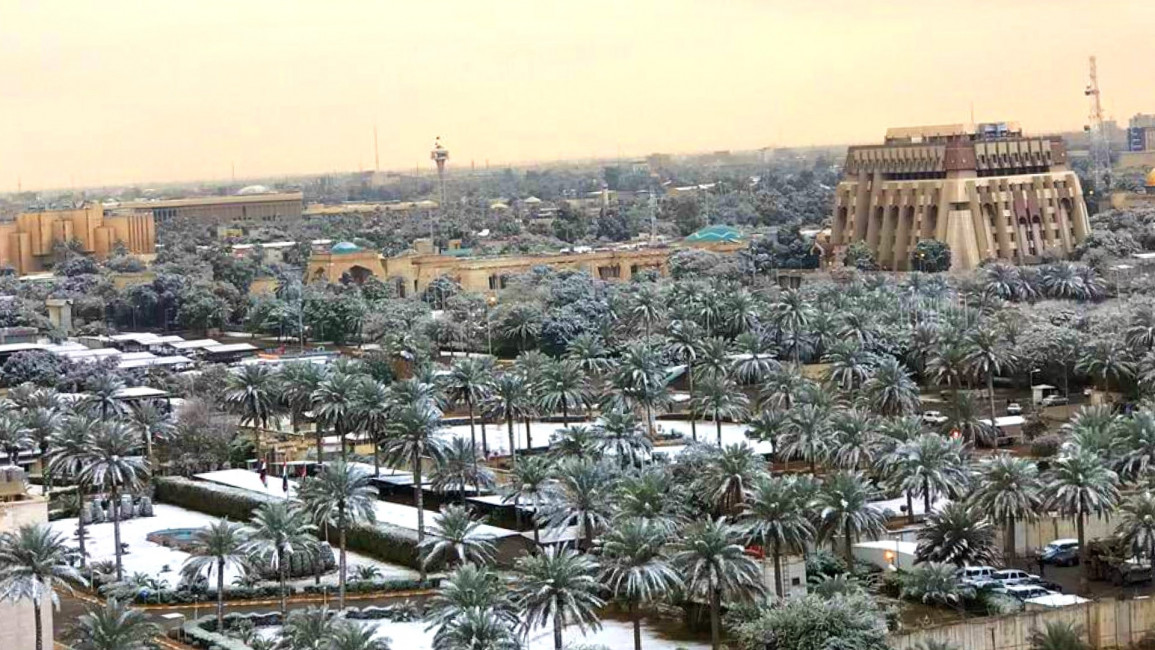Ultra-rare snowfall carpets Baghdad for second time in 100 years
The last recorded snowfall in the city was in 2008, but it was a quick and mostly slushy affair. Prior to that, it had been a century since Baghdad saw any flakes.
Iraqis young and old said it was the first time they had ever seen snow falling in Baghdad.
The city's iconic palm trees were daintily outlined in white, and the tarpaulins of the long-running anti-government protest camp in Tahrir Square in the city centre were sprinkled with snow.
Read more: Can the Middle East afford to care about the climate emergency?
People on their way to work stopped their cars to snap pictures or break out into impromptu snowball fights.
"Snowfall may continue until Wednesday given the very cold weather," said Amer al-Jaberi, media head of the Iraqi Meteorological Centre.
"This cold wave came from Europe," he told AFP.
Twitter Post
|
The people of Baghdad are more used to heat than cold.
The highest temperature recorded in the capital was a searing 51 degrees Celsius (124 degrees Fahrenheit), a record it has neared several times in recent years.
South of the capital, snow also carpeted the Shia holy city of Karbala, which draws pilgrims from round the world to its famed shrines, the golden-domed mausoleums of Abbas and Imam Hussein - the grandson of the Prophet Muhammad.
Snowfall is more common in northern Iraq, where snow covered the war-battered city of Mosul, but in the centre and south there is rarely enough precipitation.
Iraq has been hit by a succession of extreme weather events in recent years.
In 2018, chronic water shortages sparked a health crisis in the centre and south of the country but the following year heavy rains caused deadly flooding and heavy damage to homes and crops.
Blistering temperatures then hit the north triggering wild fires and scorching crops.
Experts say Iraq lacks the funding or infrastructure to cope with climate change and the desertification of once productive land.
Last month, Saudi Arabia experienced a rare cold snap that brought snowfall to deserts in the northwest of the country.
Deserts in Saudi Arabia's north and eastern region saw snow in the winter of 2016, but such an occurence remains rare across the region.
The civil defence directorate in the region launched a comprehensive emergency plan to face any potential risks from the snow, the news site also reported.
One user posted a video of the snow on Twitter, writing: "Can you believe it? This is not Russia, or Italy or Norway."
Another posted an idyllic picture of his village, where two men sat around a fire for warmth from the snow.
The cold spell will remind some of the winter of 2008, which was the coldest in recent memory, with temperatures dropping to -10 degrees Celsius in some provinces, and -5 Celsius in Riyadh.
The average low temperature in the Saudi capital is 11 degrees Celsius this time of the year.
Although these weather conditions are unusual in the kingdom and the Arabian Peninsula, climate change and other weather-related phenomena are making extreme weather the "new normal".
Agencies contributed to this report.
Follow us on Facebook, Twitter and Instagram to stay connected



